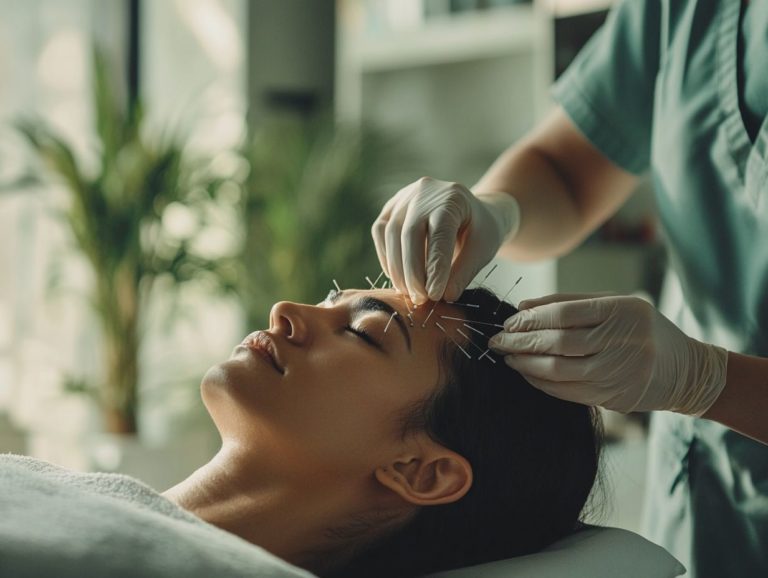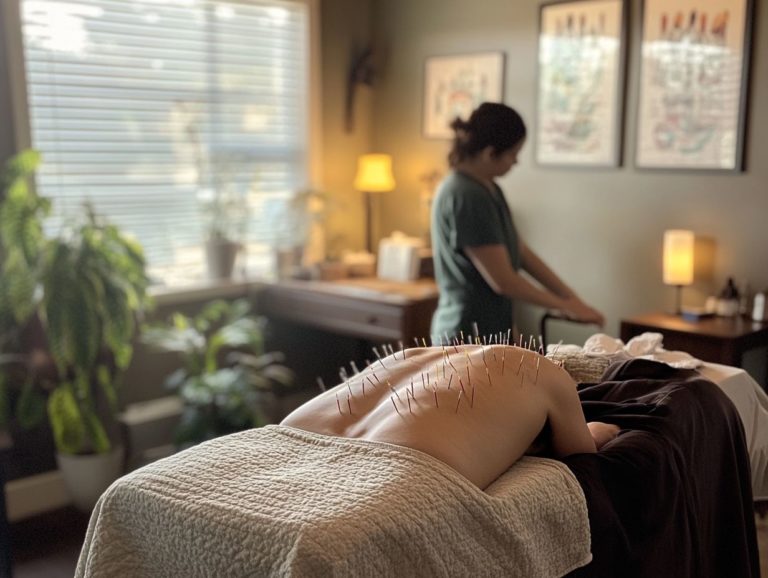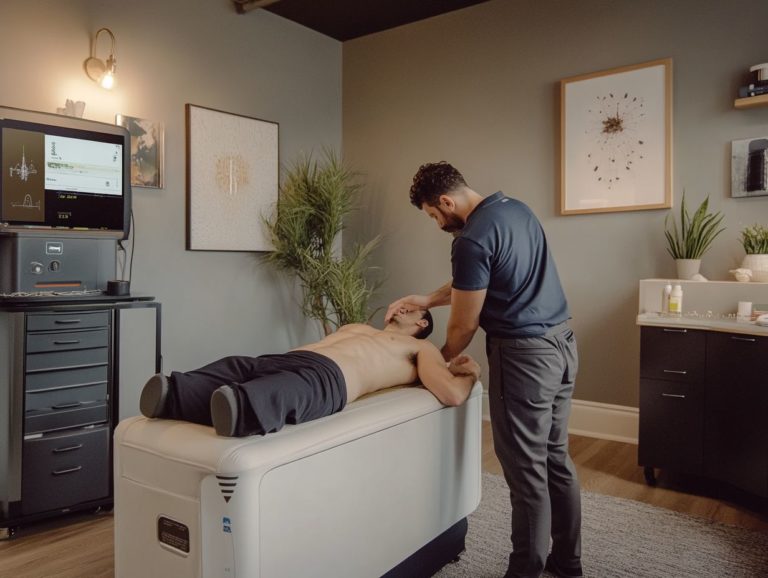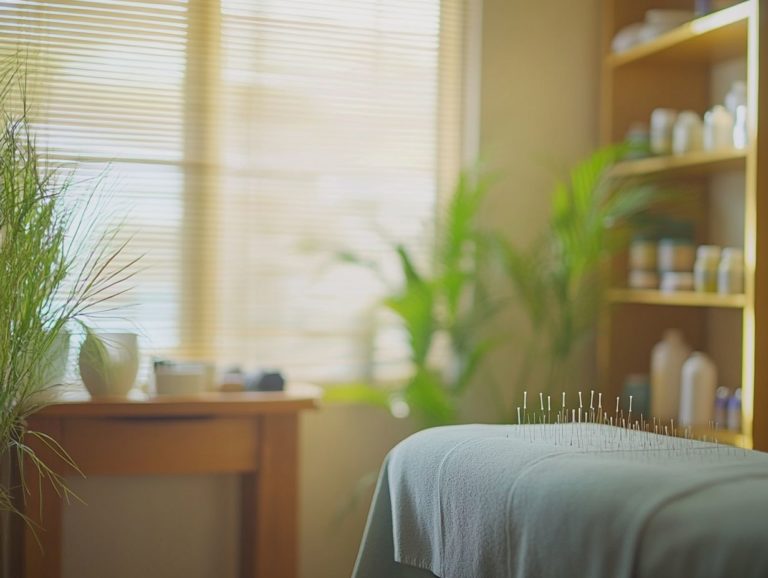Acupuncture Safety: What You Should Be Aware Of
Acupuncture, an ancient healing practice steeped in the principles of Traditional Chinese Medicine, has garnered wide acclaim for its ability to alleviate a range of ailments.
In this guide, you will delve into the rich history of acupuncture, uncover its mechanisms, and discover the numerous benefits it offers for both physical and mental well-being.
As with any treatment, it s crucial to remain informed about potential risks and safety considerations.
You ll learn what to seek in a qualified practitioner and how to ensure a safe and effective acupuncture experience.
Whether you re a curious newcomer or looking to deepen your understanding, this guide provides valuable insights into the fascinating realm of acupuncture.
Contents
- Key Takeaways:
- What is Acupuncture?
- How Does Acupuncture Work?
- Benefits of Acupuncture
- Potential Risks of Acupuncture
- Factors That Affect Acupuncture Safety
- Ensuring Safe Acupuncture Treatment
- Frequently Asked Questions
- What is acupuncture and is it safe?
- What are the potential risks or side effects of acupuncture?
- How can I ensure the safety of my acupuncture treatment?
- Are there any specific safety precautions I should take before or after an acupuncture session?
- Can anyone receive acupuncture or are there certain people who should avoid it?
- Is acupuncture safe for children?
Key Takeaways:

Acupuncture, a form of traditional Chinese medicine, has a long history and involves the insertion of thin needles into specific points on the body to stimulate healing.
While the exact mechanism of how acupuncture works is not fully understood, it is believed to balance the body’s vital energy and promote overall health and well-being.
Acupuncture has been shown to have numerous physical and mental health benefits, including pain relief, stress reduction, and improved sleep.
What is Acupuncture?
Acupuncture stands as a revered practice steeped in the principles of Traditional Chinese Medicine (TCM). It expertly targets specific acupuncture points, or acupoints, using sterile needles to enhance the flow of energy, or qi, throughout the body.
This a minimally invasive procedure is carried out by licensed practitioners, earning wide acclaim for its efficacy in addressing a wide array of health concerns, from chronic pain relief to fostering emotional wellness.
Overview and History
The history of acupuncture stretches back thousands of years, deeply rooted in Traditional Chinese Medicine. It has earned the endorsement of esteemed organizations like the World Health Organization for its therapeutic benefits.
This ancient practice, celebrated for its intricate balance of the body’s energy flow, has transcended cultural boundaries. It has evolved uniquely yet steadfastly adhered to its core principles.
From Japan’s refined techniques to Vietnam’s distinctive approaches, acupuncture has woven itself into various healing traditions. Historically, practitioners used fine needles to stimulate specific points, enhancing health and alleviating a range of ailments.
In today’s world, acupuncture often complements modern medical treatments. This demonstrates a harmonious fusion of tradition and innovation. Its rising acceptance and endorsement by health authorities underscore the growing recognition of its effectiveness in managing pain and promoting overall well-being.
How Does Acupuncture Work?
Acupuncture functions by precisely stimulating specific points along the body s energy pathways. This process enhances energy flow and engages the central nervous system. It effectively facilitates your body s innate healing processes.
Theories and Techniques
Acupuncture employs a variety of techniques to help you restore energy balance. It utilizes needles at specific trigger points to alleviate pain and enhance your overall health.
These methods are rooted in ancient Chinese medicine principles, which connect physical ailments to energy pathways throughout your body. Techniques like dry needling and electroacupuncture offer distinct approaches, each targeting specific points for targeted effects.
Recent studies suggest that stimulating these trigger points can trigger your body s release of endorphins, providing a natural method for pain relief.
Acupuncture also supports your emotional and mental well-being, making it an appealing option for anyone interested in integrative treatments.
Its versatility in addressing chronic pain, migraines, and even stress-related issues highlights its increasing acceptance in modern healthcare.
Benefits of Acupuncture
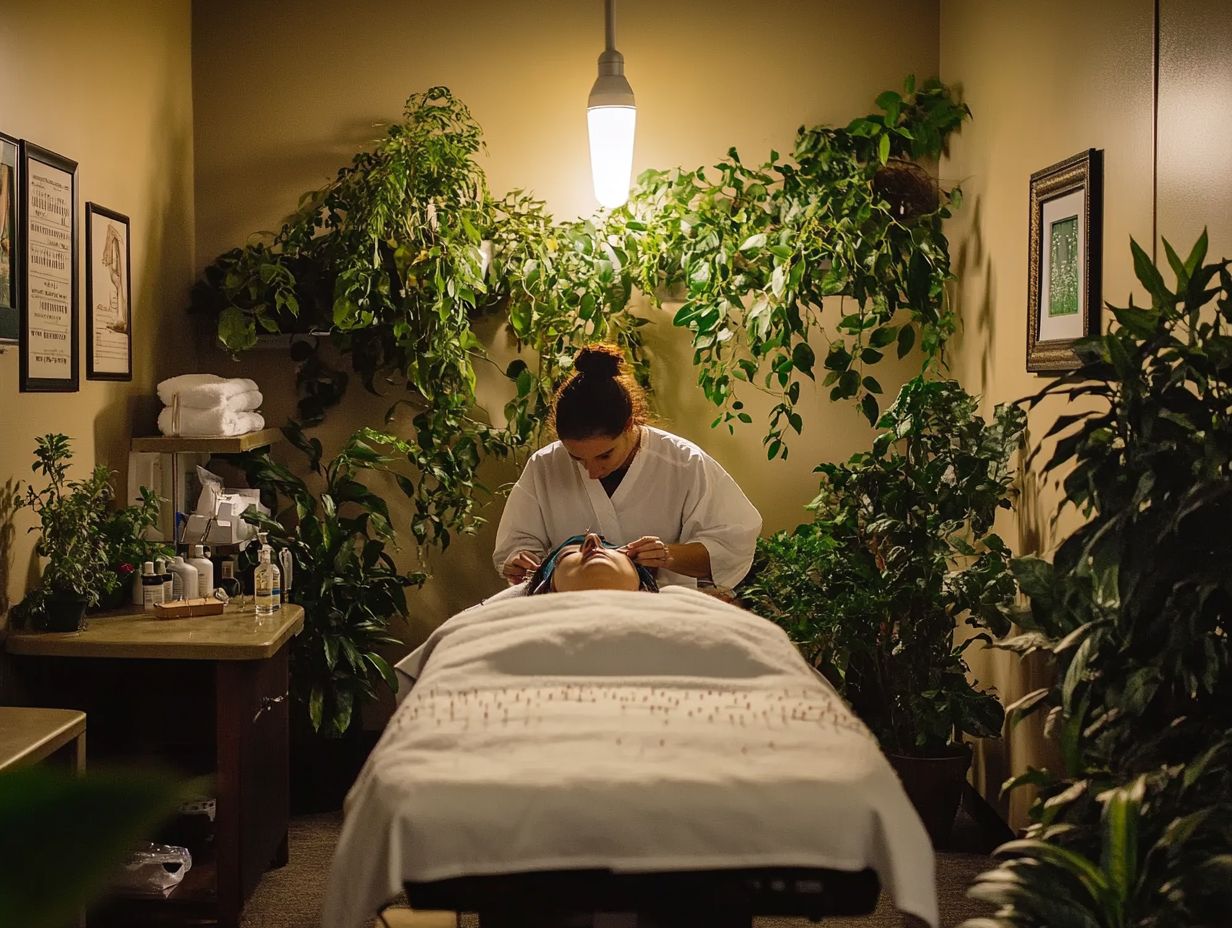
Acupuncture presents a myriad of benefits, including effective pain relief for chronic conditions and enhanced mental well-being.
Experience the remarkable benefits of this versatile treatment option! It is widely acknowledged for its efficacy across diverse healthcare settings.
In conclusion, consider acupuncture as a valuable treatment option to enhance your overall health and well-being.
Physical and Mental Health Benefits
The physical and mental health benefits of acupuncture are truly remarkable. You ll find that it positively impacts your immune system while enhancing your emotional well-being.
This age-old practice of traditional Chinese medicine does more than just relieve chronic pain think lower back discomfort and migraines. It actively supports your body s natural defenses, enabling your immune system to fend off common illnesses with greater efficiency.
Acupuncture also acts as an effective tool for stress management. It guides you toward emotional balance through the release of endorphins and other chemicals in your body that can make you feel good. Research shows that many individuals experience a significant reduction in anxiety and depression symptoms after sessions. This practice offers a holistic approach that addresses both physical ailments and mental clarity.
Potential Risks of Acupuncture
Acupuncture is often safe, but it’s important to know that risks can occur. For those considering it for reproductive health, understanding acupuncture and fertility is crucial, as minor adverse events and the possibility of injury can happen.
This highlights the necessity of consulting a qualified practitioner to ensure a safe and effective experience.
Side Effects and Safety Concerns
The side effects of acupuncture are typically mild but may include nausea, dizziness, and fatigue. This underscores the importance of seeking treatment from licensed practitioners who use sterile needles.
These mild reactions are often fleeting and can indicate your body s response to the treatment. They serve as a reminder of the vital need to adhere to safety measures consistently.
By ensuring that practitioners employ sterile techniques, you can significantly reduce the risk of infection or other complications. It’s also essential to disclose your complete medical history, including any medications you’re taking. This information can influence the effectiveness of the treatment and the likelihood of any adverse effects.
Understanding these precautions can enhance the overall safety and efficacy of acupuncture, allowing you to explore this alternative therapy with peace of mind. For more information, check out the basics of acupuncture.
Factors That Affect Acupuncture Safety
The safety of acupuncture treatment largely depends on the qualifications of licensed practitioners and their commitment to proper sterilization practices. Choosing a reputable healthcare provider is critical.
Your well-being depends on it.
Qualifications of Practitioners and Sterilization Practices

Licensed practitioners must possess the appropriate qualifications and training to perform acupuncture safely. They need to have a steadfast commitment to rigorous sterilization practices for needles.
These programs teach you important acupuncture techniques and stress the need for cleanliness to keep patients safe. You will typically engage in comprehensive educational programs that encompass both theoretical knowledge and hands-on practice.
Also, you may be required to obtain certifications that validate your competency in using sterilized equipment. Adhering to strict sterilization protocols is paramount, as it directly influences patient safety and outcomes.
Ensuring Safe Acupuncture Treatment
To ensure a safe acupuncture treatment experience, ask the right questions and take essential precautions. Selecting licensed acupuncturists for your care is vital.
Your health deserves the utmost attention. Making informed choices is key to a successful experience.
Don t wait ensure your well-being today by choosing the right practitioner!
Questions to Ask and Precautions to Take
Considering acupuncture? It’s important to ask the right questions and take precautions to ensure a safe, effective experience. For those dealing with persistent issues, learning about acupuncture for chronic fatigue can be particularly beneficial when consulting trained professionals.
Start by asking about the acupuncturist s education, certification, and experience with your specific condition. Don’t forget to check the treatment space for cleanliness and safety protocols to prevent infections.
Before your sessions begin, discuss any medical conditions or medications with your practitioner. This helps tailor the treatment to your needs.
Also, consider how often and how long you ll need treatments. These factors can influence your time and budget.
By considering these factors, you can make informed decisions that prioritize your well-being!
Frequently Asked Questions
Here are some common questions about acupuncture to help you make informed choices.
What is acupuncture and is it safe?
Acupuncture is an ancient Chinese healing practice that involves inserting thin needles into specific points on the body. This technique promotes healing and alleviates pain. When performed by a licensed and trained practitioner, acupuncture is generally considered safe and effective.
What are the potential risks or side effects of acupuncture?

While acupuncture is generally safe, some people may experience mild side effects such as bruising, bleeding, soreness, or dizziness. In rare cases, more serious side effects like infections or organ puncture may occur.
How can I ensure the safety of my acupuncture treatment?
To ensure the safety of your acupuncture treatment, seek out a licensed and experienced practitioner. It’s important to inform your practitioner of any medical conditions, medications, or allergies you may have before starting treatment.
Are there any specific safety precautions I should take before or after an acupuncture session?
Before your acupuncture session, it s recommended to avoid caffeine, alcohol, and heavy meals. After your session, drink plenty of water and avoid strenuous activities. Follow any post-treatment instructions given by your practitioner.
Can anyone receive acupuncture or are there certain people who should avoid it?
While acupuncture is generally safe for most people, there are cases where it may not be recommended. Pregnant women, individuals with bleeding disorders, and those with pacemakers should consult their doctor before receiving acupuncture.
Is acupuncture safe for children?
Yes, acupuncture can be safe and effective for children when performed by a licensed practitioner experienced in treating kids. Inform the practitioner of your child’s age and any medical conditions before starting treatment.

